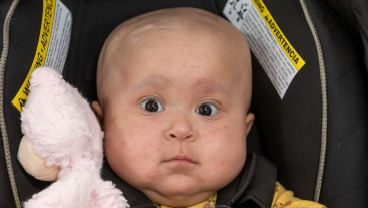Proton Therapy
Coordinated, Comprehensive Care for Cancer Patients
Children’s Mercy Kansas City is the region’s leading pediatric health system, with more than 750 pediatric subspecialists and researchers, including more than 20 doctors who specialize in children’s cancer. As a consortium partner of the National Cancer Institute-designated The University of Kansas Cancer Center, we provide innovative, collaborative care for pediatric proton therapy patients.
Proton therapy for pediatric patients
Pediatric patients receiving proton therapy at The University of Kansas Cancer Center will have a dedicated oncology team at Children’s Mercy, including a physician, advanced practice provider, and social worker.
Patients who need to be admitted to Children’s Mercy will have the added benefit of 24-hour coverage by pediatric hematology/oncology hospitalists. In addition, patients will have direct access to other doctors they may need to see—including cardiology, endocrinology, neurology, rehabilitation and other pediatric subspecialists needed as part of their care.
Coordinating closely with the University of Kansas Cancer Center’s team, our specialists will create a care plan suited to each child’s individual treatment requirements using the full range of cancer-fighting tools available at Children’s Mercy.
Childhood cancers we treat with proton therapy include:
- Atypical teratoid rhabdoid tumor
- Chordoma chondrosarcoma
- Craniopharyngioma
- Desmoid tumor
- Ependymoma
- Ewing sarcoma
- Germ cell tumors
- Glioma
- Hodgkin lymphoma
- Intracranial germ cell tumors
- Medulloblastoma
- Meningioma
- Nasopharyngeal tumors
- Neuroblastoma
- Parotid tumors
- Pineoblastoma
- Primitive neuro-ectodermal tumor
- Retinoblastoma
- Rhabdomyosarcoma
- Soft tissue sarcomas
- Wilm’s tumor
Nationally recognized for research and results
Children’s Mercy is ranked in the top 30 pediatric oncology programs in the nation, according to U.S. News & World Report. Our Cancer Center treats around 200 newly diagnosed pediatric and adolescent patients each year. We are focused on treatments and research that produce real results—like survival rates that beat the national averages—and minimize the long-term side effects of cancer treatment.
For nearly 40 years, Children’s Mercy has been an integral part of research trials as a NCI Children’s Oncology Group (COG) cancer center. Proton therapy at The University of Kansas Cancer Center will offer our patients currently participating in COG clinical trials access to this innovative treatment without needing to leave Children’s Mercy. Proton therapy for patients coming from outside of Children’s Mercy will also allow children to continue on their clinical trials with pediatric oncology expertise available.
Benefits of Proton Therapy
Proton therapy is particularly beneficial for treating children and adolescents with cancerous and noncancerous tumors. Children are at a significantly higher risk of late effects from cancer treatments compared to adults. Two-thirds of children who survive a cancer diagnosis face at least one chronic health condition. One-fourth of pediatric cancer survivors face a severe or life-threatening side effect from treatment that occurs later in life. These include heart damage, lung damage, infertility, cognitive impairment, growth deficits, hearing loss, vision loss, secondary cancers and more.
Thanks to treatment advances, including radiation, pediatric cancer survival rates have dramatically increased to nearly 85% today from 10% only decades ago. One of these advancements, proton therapy, reduces a child’s risk of experiencing harmful long-term side effects. Proton therapy limits and reduces radiation doses to healthy tissues and organs while delivering curative doses to the cancer.
Collaborative Care Against Cancer: Camaya's Story
Camaya, one of three identical triplets, was a snuggly, happy baby until around 7 months old, when her parents noticed she was unusually listless and fussy. A rapid series of tests determined Camaya had an aggressive type of brain cancer called an atypical teratoid rhabdoid tumor.
Her Children's Mercy team, led by neuro-oncologist Kevin Ginn, MD, had to get creative with the type and sequence of Camaya's treatments in order to attack the tumor without additional damage to her brain. Read more on Camaya's journey through chemotherapy, surgery and proton therapy.

- Cancer Center
- Cancer in Adolescents and Young Adults
- Brain Tumor Treatment
- Experimental Therapeutics
- Genomic Medicine in Cancer Treatment
- Histiocytosis Program
- Leukemia and Lymphoma Program
- Li Fraumeni Syndrome
- Liver Cancer Treatment
- Proton Therapy
- Soft Tissue and Bone Sarcomas
- Spanish-Speaking Cancer Clinic
- Surveillance for Predisposition to Tumors (SPoT) Clinic
- Survive & Thrive
- Cancer Center Family Care Team
- Hematology, Oncology, and Blood and Marrow Transplant
- Meet the Team
